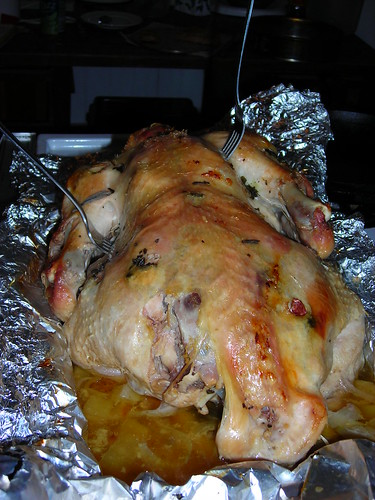Last night in the Scientist household, there was a somewhat acrimonious discussion on equilibria, due to a visual mind intersecting an entirely abstract one. "But you should be able to determine the stoichiometry at any concentration above the Kd!" "No, you have to saturate with one to eliminate cooperativity or weird stuff. Can't you picture it? And the inflection point is the ratio." "But it doesn't make sense mathematically!!!! Numbers!" "And this is why you balance the checkbook."
Here is a turkey.

(I removed the dissected turkey because I'd gotten sufficient enjoyment and it was rather gross.)
The equilibrium of the uncooked turkey tends towards it staying in the fridge; the forward reaction of decomposition is the rate-limiting step. With the application of sufficient activation energy (450 F x 3h) in the presence of garlic and potato catalysts, the equilibrium rapidly shifts toward completion. Be warned, however, that overenthusiastic heating may produce undesirable carbonized by-products.
Consumption of equilibrated turkey may prove catalytically activating for happy feelings, and may act against the pursuit of further argument.
****
Howell’s Textbook of Physiology
W. B. Saunders, 1946 (15th ed.)
Hunger. Hunger sensations are probably of some importance in determining when we eat, though the periodicity of eating is not interfered with by ending hunger sensations... That additional factors are involved is shown by a variety of evidence. For one thing, hunger pangs cease promptly with the ingestion of a few mouthfuls of food, but eating continues. Rats, after removal of the stomach… continue to eat periodically, to exhibit periodic random activity, to evidence normal hunger drive, and to maintain body weight. Such animals were as strongly motivated by a food incentive to learn a maze or overcome an obstruction as were normal rats.
…To maintain the delicate balance between food intake and food requirements demands some more specific mechanism for the control of the kind and amount of food ingested than hunger contractions and hunger sensations. Lower organisms adjust food intake to energy requirements with great exactness. Man without thought or other conscious activity does the same. [Ed.: HAH!] Thus qualitative and quantitative dietary deficiency induces a physiological hunger state which motivates the animal to food seeking or to self-selection of a diet until the state is relieved.
Digestion. Stimulation of the gastric mucosa itself can also affect the hunger contractions. This was demonstrated when Carlson introduced various substances into the stomach of Mr. V., his patient. Ice-cold water was more effective in causing this inhibition than water at body temperature. Weak acids… caused a marked inhibition of the contractions but this inhibition was only temporary, which explains the fact that the hunger movements can occur when the acid juice but no food is present, as in starvation… Beer, wine, brandy, and diluted pure alcohol inhibit both the tonus and the contractions… Rogers showed that the hunger behavior of the decerebrated pigeon [Ed.: Yuk!] is completely abolished on removal of the optic thalami.
Cannon, in his observations upon cats, found that all movements of the stomach ceased as soon as the animal showed signs of anxiety, rage or distress.